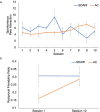A single-blind active-control randomized controlled trial of group-based social competence intervention
- PMID: 40774996
- PMCID: PMC12331927
- DOI: 10.1038/s41598-025-12876-w
A single-blind active-control randomized controlled trial of group-based social competence intervention
Abstract
This study evaluated specific effects of a blinded randomized controlled trial of a group-based social skills intervention, Socio-Dramatic Affective-Relational Intervention (SDARI), against an active attention control (AC) intervention. Fifty-five autistic youth (Mage=12.40; SDage=2.92; 73% boys) were randomly allocated to either the SDARI or the AC condition. Both interventions comprised 10 weekly sessions and were tightly matched for structure, participant age, IQ, and gender, such that the specific activities of SDARI were directly examined. Multimethod assessments at pre-, post-treatment, and 10-week follow-up included informant-reported social skills and autism-related behaviors, observer-rated spontaneous peer interaction, peer-rated friendships, and a metric of social information processing (the N170 event-related potential). Parent expectancy effect was also explored by examining perceived conditions by parents/caregivers, who were blinded to the condition assignment. Compared to the AC condition, the SDARI group evinced improvements in the N170 latency, rapid peer-liking, and reciprocal friendships at endpoint and follow-up. While the conditions did not differ on parent-reported social skills or autism-related behaviors, a parental expectancy effect was found where parent-rated social skills improvements were related to parents' perceived conditions. These results provide support for the efficacy of the specific SDARI activities on several objective, reliable outcomes of social functioning in autistic youth.
Keywords: Autism spectrum disorder; Group-based social skills intervention; Randomized controlled trial; Social skills intervention.
© 2025. The Author(s).
Conflict of interest statement
Declarations. Competing interests: The authors declare no competing interests.
Figures




Similar articles
-
Parent training interventions for Attention Deficit Hyperactivity Disorder (ADHD) in children aged 5 to 18 years.Cochrane Database Syst Rev. 2011 Dec 7;2011(12):CD003018. doi: 10.1002/14651858.CD003018.pub3. Cochrane Database Syst Rev. 2011. PMID: 22161373 Free PMC article.
-
The moderating role of co-occurring attention-deficit hyperactivity disorder in social skills group training for autistic children and adolescents.Autism. 2025 Aug;29(8):2030-2043. doi: 10.1177/13623613251331993. Epub 2025 Apr 23. Autism. 2025. PMID: 40265462 Free PMC article. Clinical Trial.
-
Motor and socio-cognitive mechanisms explaining peers' synchronization of joint action across development in autistic and non-autistic children.Autism. 2025 Jul;29(7):1819-1834. doi: 10.1177/13623613251328437. Epub 2025 Mar 26. Autism. 2025. PMID: 40138466 Free PMC article.
-
Physical exercise training interventions for children and young adults during and after treatment for childhood cancer.Cochrane Database Syst Rev. 2013 Apr 30;(4):CD008796. doi: 10.1002/14651858.CD008796.pub2. Cochrane Database Syst Rev. 2013. Update in: Cochrane Database Syst Rev. 2016 Mar 31;3:CD008796. doi: 10.1002/14651858.CD008796.pub3. PMID: 23633361 Updated.
-
Pilot randomized controlled trial of MINDful TIME, a novel telehealth mindfulness-based intervention for autistic adolescents and their caregivers.Autism. 2025 Jul;29(7):1864-1882. doi: 10.1177/13623613251328484. Epub 2025 Mar 31. Autism. 2025. PMID: 40160168 Clinical Trial.
References
-
- White, S., Keonig, K. & Scahill, L. Social skills development in children with autism spectrum disorders: A review of the intervention research. J. Autism Dev. Disord. 37, 1858–1868 (2007). - PubMed
-
- Jones, R. M., Carberry, C., Hamo, A. & Lord, C. Placebo-like response in absence of treatment in children with autism. Autism Res.10, 1567–1572 (2017). - PubMed
Publication types
MeSH terms
LinkOut - more resources
Full Text Sources

